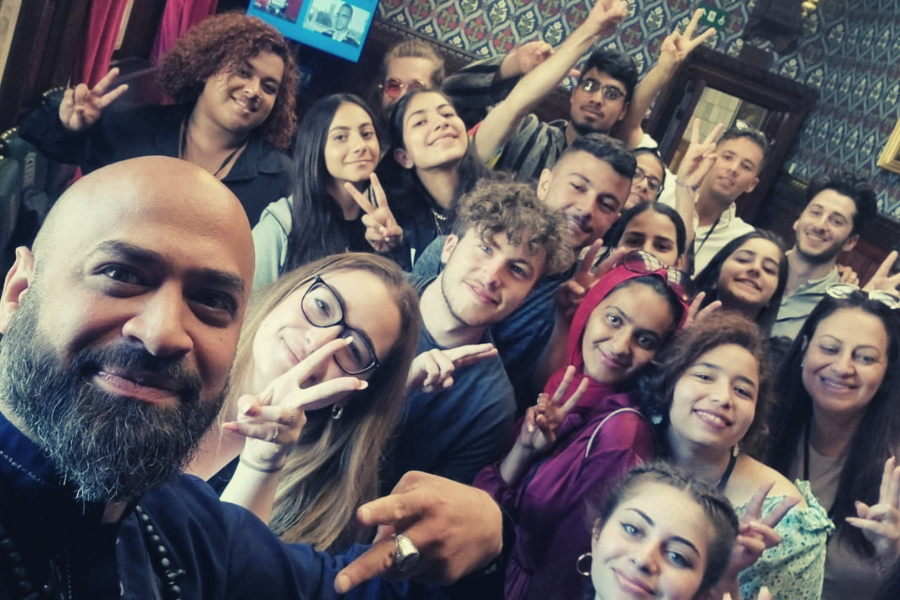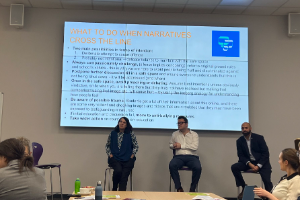
This week our Youth and Partnerships Director, Ali Amla, marks the convergence of Interfaith Week (13th-20th November), Anti-Bullying Week (14th-18th November), and Islamophobia Awareness Month. Ali previously reflected on racism in an earlier piece:
https://solutionsnotsides.co.uk/blog/reflecting-on-racism
When it comes to Israel-Palestine, the fallout of this globalised conflict in UK schools is a toxic combo of antisemitism and Islamophobia, bullying and rising tensions between communities.
As our work at Solutions Not Sides this week intersects with Anti-Bullying Week, Islamophobia Awareness Month and Interfaith Week, this reflection aims to explore the connections and challenges within these issues. Humanisation and empathy help counter the growth of Islamophobic and Antisemitic bullying we observe in society - and this is a fundamental element of the work we do with young people and their teachers.
Interfaith is vital in fostering cohesive communities in which everyone feels that they belong; however the worrying upward trend of hate crimes and hate becoming somewhat mainstream is an indication of how much work we and our partners still have left to do. I will be sharing some of my thoughts on ‘using restorative justice for faith-based hate crime’ organised by Faith and Belief Forum and Why Me? On Friday 25th November: https://www.tickettailor.com/events/whyme/768010/
I am looking forward to having a meaningful discussion with the panel on how restorative justice can be used to heal social division caused by the growing level of faith-based hate crime. Islamophobia has become normalised in Britain; the number of hate crimes targeting Muslims rose to 3,459 in the year ending March 2022, an increase of 42%, a total of 8730 religiously motivated hate crimes, an increase of 37%, with 70% of hate crimes being racially motivated.
More effective interfaith is one strand in the fight to counter social division and hatred, which is only possible if Interfaith goes beyond ‘tea and samosas’ or the occasional hummus and baklava. Unfortunately Interfaith faces many challenges, especially as it is poorly resourced, relies heavily on volunteers and often places the onus on the communities facing the most amount of prejudice. Developing a multi-pronged strategy to tackle faith-based hate crime is essential, which includes the need to challenge the social phenomenon of hate and reclaim the media and political narrative.
Israel-Palestine has become the ‘elephant in the room’ for many involved in interfaith. I don't deny the challenges and difficulties in facilitating dialogue on Israel-Palestine, and am often reminded why there is a need to tread carefully as I have observed it going wrong, with temperatures rising, emotions becoming triggers, relationships becoming strained until the decision is reached that it's easier to avoid Israel-Palestine. However, to foster community cohesion across communities experiencing increasing levels of Antisemitism and Islamophobia, the creation of spaces for increasing understanding of the issues surrounding the Israel-Palestine must be cultivated.

At SNS we are not an interfaith project; however interfaith intersects our Student Leadership Programmes and touches on all the work that we do. Young people from different faiths and none join us during our Bridge Builders Programme, to have a unique opportunity to explore the impact of Israel-Palestine on community relations. The journey of empowerment begins by co-creating safe and courageous spaces, exploring faith and identity, and finding our common ground in order to begin having more difficult conversations. Through learning essential non-violent communication skills, participants go on to have a deeper understanding of Antisemitism and Islamophobia, the importance of standing together, and fostering interfaith solidarity. This becomes increasingly important as we saw Antisemitic hate crimes increase by 570% and Anti-Muslim hate crimes increase by 430% during the eleven days of escalated violence in Spring 2021 in Israel-Palestine. The week deepens as it progresses, nurturing skills in public speaking, constructing your narrative, fostering good relations on campus and insights into solutions-focused activism with the week concluding with elevator pitches on the issues young people would like to resolve when returning home. Further details can be found here: https://solutionsnotsides.co.uk/student-leadership-programme
The increasingly polarised nature of discussions around Israel-Palestine have had a direct effect on Antisemitic and Islamophobic bullying in UK schools, with incidents affecting both students and teachers. Our Youth Education Program (https://solutionsnotsides.co.uk/schools) exists to support young people to hold more nuanced perspectives relating to Israel-Palestine, providing the opportunity and space to engage with this issue and meet activists working for peace. Through challenging previously-held or entrenched beliefs about ‘the other’ within communities, better cross-community interactions can be built, while Antisemitism and Islamophobia can be combatted. It also teaches young people about being critically minded, and to have empathy with others, even those that they disagree with.
SNS is one piece of the jigsaw that complements the great work of our partners, who work in education and interfaith, fostering cohesion, deepening faith literacy, empowering young people to make change and creating a more inclusive and respectful society by addressing the root causes of prejudice. A crucial part of the work we do is working with teachers and community leaders, delivering training sessions where professionals can have an immersive experience of understanding and countering Antisemitism and Islamophobia in relation to the Israel-Palestine. In doing this, professionals are equipped with a better-developed understanding of Islamophobia and Antisemitism, how they relate to Israel-Palestine dialogue in the UK, and how to counter bullying, hate and conflict that may arise.
It is only by working together that we can make a difference - this is a shout out to all my friends and colleagues who work tirelessly, who are too many to mention by name, and who will always stand in solidarity with our joint struggle to make society a better place for all.
I conclude with the words of the murdered MP Jo Cox: ”we are far more united and have far more in common with each other than the things that divide us”